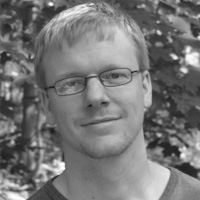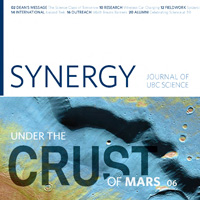| Recycled anti-parasite drug could be potent TB treatment |
Drugs used to treat parasitic diseases are showing surprising potential
as a therapy for tuberculosis. UBC microbiologists conducted in vitro
tests of the avermectin family of drugs, commonly used to eliminate the
parasitic worms that cause river blindness and elephantiasis. It turns
out the drugs also destroy the bacteria that cause TB, including drug
resistant forms of the disease.
“These drugs are cheap, routinely produced by pharmaceutical companies,
and in many cases, approved for humans use,” says UBC’s Santiago
Ramón-García, co-author on the paper.
Read More »
|
|
|
|
|
| Astrophysicists break ground on Canada’s largest radio telescope |
A UBC-led team began construction last week on Canada’s largest radio telescope on a snow-filled site outside Penticton, B.C.
The new telescope, with a footprint larger than six NHL hockey rinks,
will listen for cosmic sound waves and help scientists look back in time
to understand why our universe has expanded so rapidly. Part of the
$11-million Canadian Hydrogen Intensity-Mapping Experiment, the
telescope boasts a 100-metre-by-100-metre collecting area filled with
2,560 low-noise receivers built with components adapted from the cell
phone industry. Collectively, it will scan half of the sky every day.
"We plan to map a quarter of the observable universe," says University
of British Columbia astrophysicist Mark Halpern, the project's principal
investigator. "This is an ambitious, made-in-Canada endeavor."
Read More »
|
 |
|
| |
|
|
| Kudos |
Quantum materials and digital media to be focus of new CERCs
UBC Science has gained Canada Excellence Research Chairs valued at $20 million over seven years in quantum materials and devices and digital media research and innovation.
Hancock wins top pharmaceutical award
UBC microbiologist Robert Hancock has received the Prix Galien 2012 Research Award,
widely considered the most prestigious honour in Canadian
pharmaceutical research and innovation. Hancock was recognized for
pioneering work in the field of antibiotics and bacteria.
Botanists inducted into US science society
Three UBC botanists have been named fellows of the American Association for the Advancement of Science. Beverley Green, Patrick Keeling and Geoffrey Wasteneys are now part of the world’s largest general scientific society.
UBC ‘outnumbers’ Canadian competition
Eleven UBC mathematicians have been named to the inaugural class of American Mathematical Society fellows
– more than any other Canadian institution. The new fellows are:
Alejandro Adem, Martin Thomas Barlow, David William Boyd, James B
Carrell, William Allen Casselman, Ailana Fraser, Nassif Ghoussoub,
Izabella Laba, Zinovy Reichstein, Maurice Sion and Gordon Slade.
Gregor Kiczales inducted as 2012 ACM fellow
UBC computer scientist Gregor Kiczales has been named a 2012 Association for Computing Machinery fellow for his contribution to aspect-oriented programming language design and implementation.
|
|
|
|
|
| UBC math alum picks up technical Oscar |
This February, UBC Math alum Doug James will be sharing a technical
achievement Oscar for his work on the wavelet turbulence simulation, a
technique which allows the creation of more realistic gas and fire
visual effects.
Wavelet turbulence is an algorithm that allows for faster and better
simulation of formerly time-consuming effects such as volcanic eruptions
and explosions. It has been used in movies such as Monsters vs. Aliens, Transformers: Revenge of the Fallen and the upcoming Iron Man 3.
Doug James received his PhD at UBC in Applied Mathematics in 2001. He
is currently an associate professor in Computer Science at Cornell
University.
Read more Class Connections »
Send us an update »
|
 |
|
| |
|
|
| Computer Science looks for photos, memories |
UBC Computer Science is celebrating its 45th anniversary on Alumni
Weekend, May 25th. In preparation for the celebration, the CS Department
45th Anniversary Planning Committee is looking for memories and photos
from CS alumni which will be used in a website showcasing the
department's history.
Describe a highlight, a fun memory from your years at UBC CS, or tell
us about something that you've done with your education since then that
you're proud of. If you have a photo of yourself or any pictures of your
time at UBC, please include them for the timeline!
|
 |
|
| |
|
|
| Sloan grant to help UBC compare notes on classroom innovation |
UBC is leading a group of top North American universities in an effort
to speed up the adoption of innovative teaching techniques in science
classrooms.
The Bay View Alliance – which includes the University of California
Davis, University of Kansas, Indiana University Bloomington, the
University of Texas Austin and Canadian institutions – was launched in
November with a $800,000 grant from the Alfred P Sloan Foundation.
“We’ve built up a robust body of knowledge about what works – and what
doesn’t – when teaching science to undergraduates,” says Lorne
Whitehead, a UBC physics professor and principal investigator for the
alliance. “Yet for reasons we don’t completely understand, that
knowledge has had trouble making its way into classrooms and curricula.”
Read More »
|
 |
|
| |
|
|
| Go green and enjoy Synergy on your computer or tablet |
Published twice a year, Synergy is UBC Science's journal of research, discovery and innovation. And now Synergy
is going green, with a digital edition that contains interactive
content and allows for easy browsing on your tablet or computer. Keep
your paper subscription to Synergy and also enjoy the digital copy, or go completely green. It's your choice! Just update your contact information at science.ubc.ca/update or e-mail alumni@science.ubc.ca and let us know.
|
 |
|
| |
|
|
| Researcher’s donation secures Okanagan habitat |
UBC zoologist Sarah Otto is using her MacArthur genius grant to help
preserve fragile habitats in the South Okanagan of BC. The researcher is
donating two gifts of $50,000 each to the Nature Trust of BC and the
Nature Conservancy of Canada. The money will help protect at-risk
species of woodpeckers, sparrows, badgers, turtles, plants and trees.
“Seeing this remarkable region, home to so many species from bighorn
sheep to cacti, made me aware of the diversity of life in this part of
Canada and also its fragility as an ecosystem,” says Otto.
Read More »
|
 |
|
| |
|
|
 |
| |
|
|
UBC Faculty of Science
Office of the Dean
Earth Sciences Building
2178-2207 Main Mall
Vancouver, BC, V6T 1Z4 |
|
| |
 |
|
|